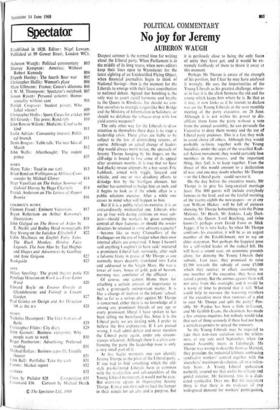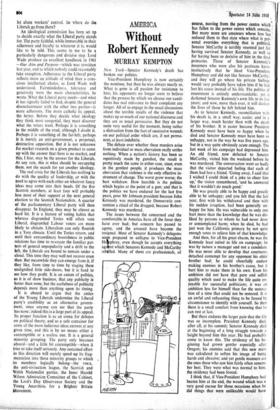No joy for Jeremy
POLITICAL COMMENTARY AUBERON 'WAUGH
Deepest summer is the normal time for writing about the Liberal party. When Parliament is in the middle of its long recess, when news editors keep their lines open to Warminster for the latest sighting of an Unidentified Flying Object, when financial journalists begin to think of National Savings—then is the moment for the Liberals to emerge with their latest contribution to national debate. Agreed that bombing is the only way to assert racial harmony and loyalty to the Queen in Rhodesia, but should we con- fine ourselves to strategic targets like Belt Bridge and the Ministry of Information in Salisbury. or should we defoliate the tobacco crop with low yield atomic weapons?
The only other way for the Liberals to draw attention to themselves these days is to stage a leadership crisis. These crises are liable to be subject to the law of diminishing returns, of course. Although an actual change of leader- ship would always merit notice, the spectacle of Jeremy Thorpe hanging by his fingers on the cliff-edge is bound to lose some of its appeal after seventeen months. It is true that we have had plucky rescue attempts by a boy scout. Eric Lubbock, armed with toggle, lanyard and whistle, and one or two desultory efforts to dislodge him by the hooligan element, but neither has contrived to budge him an inch. and it begins to look as if the whole affair is a public relations exercise. After a while one ceases to mind what will happen to him.
But if it is a public relations exercise, it is an extraordinarily mishandled one. Liberals who are 4ta free with daring opinions on most sub- jects—should the worker; be given complete control of their factories, or should the rentier directors be retained in some advisory capacity? —become like so many Chancellors of the Exchequer on the eve of budget when their own internal affairs are concerned. 'I hope I haven't said anything I oughtn't to have said,' muttered a prominent Liberal lady nervously, after such a fulsome litany in praise of Mr Thorpe as one normally hears decently translated into Latin and addressed to the Virgin Mary. He was a tower of ivory, house of gold, gate of heaven, morning star, comforter of the afflicted . . .
Of course, one cannot blame them for attaching a certain amount of importance to such a grotesquely unimportant matter. It is like a change of matron at the infants school. But so far as a serious plot against Mr Thorpe is concerned, either there is no knowledge of it among any prominent liberals of any age or every prominent liberal I have spoken to has been telling me bare-faced lies. Since it is the Liberal party we are dealing with, I prefer to believe the first explanation. If I am proved wrong. I shall admit defeat and never mention the Liberal party again, under any circum- stances whatever. Although there is a crisis con- fronting the party the leadership issue is only a very small part of it.
At less hectic moments one can identify Jeremy Thorpe as the pivot of the Liberal party. . If one had to find something which the old- style pre-Grimond Liberals have in common with the svndicaiists and sub-anarchists of the Young Liberal movement, it would not be easy. But everyone agrees in disparaging Jeremy Thorpe. It may not do much to feed the hunger in their minds for an aim and a purpose, but it is perilously close to being the only focus of unity they have got, and it would be ex- tremely foolhardy of them to throw it away at this moment.
Perhaps Mr Thorpe is aware of the strength of his position, but I fear he may have analysed it wrongly. He sees the importunities of the Young Liberals as his greatest challenge, where- as in fact it is the clash between the old and the
young which keeps him where he is. Be that as it may, it now looks as if he intends to declare war on the Young Liberals at the next monthly meeting of the party executive, on 28 June.
Although it is not within his power to dis- affiliate them from the party without a vote from the annual assembly, he can persuade the Executive to deny them money and the use of Liberal party premises. This is a fate they wish to avoid above all others. Although they would probably re-form, together with the Young Socialists, under the aegis of the so-called Radi- cal Action movement, they would certainly lose members in the process, and the important thing, they feel, is to keep together. Even the threat of this would amount to a declaration of war. and one may doubt whether Mr Thorpe —or the Liberal party—could survive it.
On the day before the executive meets, Mr Thorpe is to give his long-awaited marriage feast. The 800 guests will include everybody famous in the land, and on the fateful morning of the t\N enty-eighth the newspapers—or at any rate William Hickey —will be full of picturet showing Mr Thorpe hobnobbing with the Prime Minister. Mr Heath, Mr Jenkins, Lady Dart- mouth, the Queen. Lord Beeching, and (who knows'?) perhaps even David Frost or Mick Jagger. if he is very lucky. So when Mr Thorpe confronts his executive, it will be as an august member of the Establishment, not to say an elder statesman. Not perhaps the happiest pose for a self-styled leader of the radical left. He will have a sound case. on economic grounds alone, for denying the Young Liberals their subsidy. Last year, they promised to raise £1,500 towards the subsidy of some £5,000 which they receive: in effect, according to one member of the executive, they have not raised a penny. But the animus against them will not arise from this oversight, and it would be a waste of time to pretend that it will. What could help to reassure the wavering members of the executive more than rumours of a plot to oust Mr Thorpe and split the party? Pos- sibly Mr Pardoe has been a little indiscreet, and Mr Griffith Evans, the chairman, has made a few anxious inquiries. but nobody would take that sort of thing seriously if there had not been a certain eagerness to spread the rumours.
So the Young Liberals may be required to take their non-state socialism into the wilder- ness, at any rate until September, when the annual Assembly meets in Edinburgh. Mr Thorpe was wrong to describe them as Marxist; they postulate the industrial kibbutz. embracing syndicalist workers' control together with the anarchists' maximum devolution, all on a volun- tary basis. A Young Liberal spokesman earnestly assured me that under his urbane and genial exterior, Mr Grimond, too, is a dedi- cated syndicalist. Dear me. But the important thing is that there is no evidence of any widespread demand for workers' participation, let alone workers' control. So where do the Liberals go from there?
An ideological commission has been set up to decide exactly what the Liberal party stands for. The party faithful, while immovable in their adherence and loyalty to whatever it is, would like to be told. This seems to me to be a particularly dangerous and divisive step. Lord Wade produce an excellent handbook in 1961 —Our Aim and Purpose—which was rewritten last year, and to which nobody could reasonably take exception. Adherence to the Liberal party reflects more an attitude of mind than a cons- cious intellectual choice, as Lord Wade well understood. Fairmindedness, tolerance and generosity were the main characteristics, he wrote. What the Liberal party needs—and what it has signally failed to find, despite the general disenchantment with the other two parties—is more adherents. The more catholic its appeal, the better. Before they decide what ideology they think most congenial, they must discover what the voters want. Perhaps it is something In the middle of the road, although I doubt it. Perhaps it is something of the far-left; perhaps it is merely an anti-government, a perpetual, destructive opposition. But it is not unknown for market research on a given product to come up with the answer that there is no market, and this, I fear, may be the answer for the Liberals. At any rate, this is what should be occupying them, not the search for yet another ideology.
The real crisis for the Liberals has nothing to do with the quality of leadership, or with the need to agree with each other on whatever fancy ideas may come into their heads. Of the five Scottish members, at least four will probably lose most of their support at the next general election to the Scottish Nationalists. A quarter of the parliamentary Liberal party will then disappear. In England, they may be almost as bard hit. It is a feature of voting habits that whereas disgruntled Tories will often vote Liberal, disgruntled Labour voters are more likely to abstain. Liberalism can only flourish in a Tory climate. Until the Tories return, and until their extraordinary boorishness in public relations has time to re-create the familiar pat- tern of general unpopularity and a drift to the left, the Liberals are bound to remain under a cloud. This time they may well not recover even then. But meanwhile they can emerge from it, if they like, from time to time by staging these undignified little side-shows, but it is hard to see how they profit. It is an axiom of politics, as it is of show business, that any publicity is better than none, but the usefulness of publicity depends more than anything upon its timing.
It is absurd to argue that the antics of the Young Liberals undermine the Liberal party's credibility as an alternative govern- ment, since anyone can see that the party has none; indeed this is a large part of its appeal. Its proper function is as an arena for debates on political theory, and as a safe container for some of the more ludicrous ideas current at any given time, and this is by no means either a contemptible or a useless one. It is a general minority grouping. The party only becomes absurd—and a little bit contemptible—when it tries to take itself seriously. Any sustained effort in this direction will merely speed up its frag- mentation into those minority groups to which its members logically belong—the YMCA, the anti-vivisection league, the Scottish and Welsh Nationalist parties, the Inner Harold Wilson Admiration Committee of the Cabinet, the Lord's Day Observance Society and the Young Anarchists for a Brighter Britain Movement.











































 Previous page
Previous page